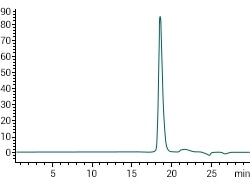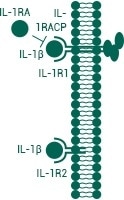Innate immunity and the IL-1 family
The innate immune response is the first line of defense against infections. Among the many families of cytokines involved in the immune system, the IL-1 family is most strongly associated with innate immunity.
Comprised of nine ligands, the IL-1 family is predominantly associated with inflammation, however, two of its ligands possess anti-inflammatory activity.
Broadly described, interleukin-1β (IL-1β), along with IL-1α and IL-18, is known to orchestrate the immune response through a multitude of downstream mechanisms.
For example, IL-1β—a pro-inflammatory cytokine belonging to the IL-1 family—participates in the regulation of IL-6 and TNF-α, and can also facilitate vascular endothelia transmigration via ICAM-1.
IL-1β transduces its signal by binding with the receptor IL-1R1, which is complexed with the accessory protein IL-1RAcP. Negative regulation of IL-1β signaling is instigated by the decoy receptor IL-1 receptor Type II (IL-1R2), and the receptor antagonist IL-1RA.
Applications of IL-1 research
While researchers have unraveled much of the complexity of the immune system, there is still a great deal left to be understood—and the IL-1 family is no exception. As the pieces of this puzzle are assembled, concurrent strides are made in a host of associated fields. These include cancer research, biomarker discovery, drug discovery and neurobiology.
For example, evidence supports a pro-tumorigenic role for IL-1β across all cancer types, with many associations between IL-1β and increased tumor growth, invasiveness and angiogenesis.
Accordingly, IL-1β has lent itself as a predictive biomarker of survival outcomes in patients with head and neck squamous cell carcinoma treated with cetuximab-based chemotherapy. However, by inducing both Th1 and Th17 responses, IL-1β also can be anti-tumorigenic.
These dichotomous findings, implicating antithetical roles for IL-1β in cancer, must be carefully considered when developing anti-cancer therapies designed to inhibit IL-1β.
Indeed, IL-1β research has led to the production of IL-1β inhibitors, such as canakinumab for treating inflammatory diseases. Chronic inflammation caused by prolonged production of IL-1β is known to increase the risk of clinical manifestations of disease. These include neurological disorders such as inflammation-associated anorexia.
Sino Biological recombinant IL-1β and IL-1β receptor reagents
Further research into the IL-1 family will precipitate improved therapeutics for a range of diseases. To this end, Sino Biological has developed a panel of recombinant IL-1β and IL-1β receptor reagents for studying the innate immune response. These include:
Mature IL-1β proteins
Compared to competing products, Sino Biological's IL-1β protein demonstrates a higher bioactivity as demonstrated by a greater induced IFNγ secretion in mice. Recombinant IL-1β proteins are available as either a pro form or a mature form.
The former can be purchased derived from either human or rat and is available in sizes ranging from 20 µg to 1 mg (bulk order inquiries can be made for all Sino Biological products), while the latter are derived from the following organisms: cynomolgus, canine, human, rat, pig, mouse, rabbit and feline and are available in sizes from 5 µg to 1 mg.

>95% Purity Determined by SEC-HPLC (Cat#: 10139-HNAE). Image Credit: Sino Biological Inc.

Induce Interferon Gamma Secretion (Cat#: 50101-MNAE). Image Credit: Sino Biological Inc.
Sino Biological also produces IL-1β signaling receptors, IL-1R1 & IL-1RACP, which induce downstream signaling cascades and gene transcription involved in inflammatory and immune pathways, as well as a decoy receptor, IL-1R2.

Image Credit: Sino Biological Inc.
There are 9 IL-1R1 proteins produced in-house, which cover various species. Among these, there are 3 human IL-1R1 proteins, 2 mouse IL-1R1 proteins, 2 rat IL-1R1 proteins and 2 cynomolgus IL-1R1 proteins.
All these IL-1R1 proteins are expressed by different host cells. 9 IL-1R1 proteins are expressed by HEK293 cells. These IL-1R1 proteins are produced with different tags, including His Tags, hFc Tags and His & mFc Tags. As above these are available in a range of sizes ranging from 50 µg to 1 mg.
There are 8 IL-1RAP/IL-1RAcP proteins produced in-house, which cover various species. Among these IL-1RAP/IL-1RAcP proteins, there are 4 human IL1RAP/IL-1RAcP proteins, 2 mouse IL1RAP/IL-1RAcP proteins and 2 cynomolgus IL-1RAP/IL-1RAcP proteins.
All these IL-1RAP/IL-1RAcP proteins are expressed by different host cells. 8 IL-1RAP/IL-1RAcP proteins are expressed by HEK293 cells. These IL-1RAP/IL-1RAcP proteins are produced with different tags, including His Tags, His & AVI Tags, hFc Tags and His & hFc Tags.
There are 9 IL-1R2 proteins produced in-house, which cover various species. Among these IL-1R2 proteins, there are 4 human IL-1R2 proteins, 2 mouse IL-1R2 proteins, 1 rat IL-1R2 protein, 1 canine IL-1R2 protein and 1 cynomolgus IL-1R2 protein.
All these IL-1R2 proteins are expressed by different host cells. 9 IL-1R2 proteins are expressed by HEK293 cells. These IL-1R2 proteins are produced with different tags, including His Tags, hFc Tags.
Sino Biological also produces the receptor antagonist, IL-1RA, which competes with IL-1 to bind IL-1R1.
All Sino Biological recombinant IL-1β and IL-1β receptor reagents are produced at high purity (>95%), high bioactivity and qualified raw materials ensure animal-free production.
In addition, Sino Biological produces interleukin 1 alpha (IL-1α). This molecule is another important member of IL-1 family and possesses overlapping functions with IL-1β. There are 4 IL-1α/IL1A proteins produced in-house, which cover various species.
Among these IL-1α/IL1A proteins, there is 1 mouse IL-1α/IL1A protein, 1 rat IL-1α/IL1A protein, and 2 human IL-1α/IL1A proteins. All these IL-1α /IL1A proteins are expressed by different host cells. 3 IL-1α /IL1A proteins are expressed by E. coli, and 1 IL-1α /IL1A protein is expressed by HEK293 cells.
ELISA antibody pairs for IL-1β
Sino Biological also produces ELISA Antibody Pairs for IL-1β. ELISA is a common technique to detect IL-1β protein and Sino Biological has developed several ELISA antibodies against IL-1β. These include a recommended ELISA Antibody Pair and recommended ELISA Antibodies.
References

Sino Biological is an international reagent supplier and service provider. The company specializes in recombinant protein production and antibody development. All of Sino Biological's products are independently developed and produced, including recombinant proteins, antibodies and cDNA clones. Sino Biological is the researchers' one-stop technical services shop for the advanced technology platforms they need to make advancements. In addition, Sino Biological offer pharmaceutical companies and biotechnology firms pre-clinical production technology services for hundreds of monoclonal antibody drug candidates.
Sponsored Content Policy: News-Medical.net publishes articles and related content that may be derived from sources where we have existing commercial relationships, provided such content adds value to the core editorial ethos of News-Medical.Net which is to educate and inform site visitors interested in medical research, science, medical devices and treatments.